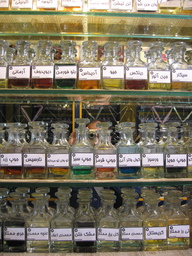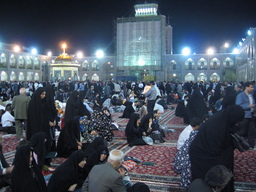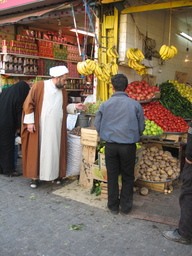
Vials of Perfume
 Vials of Perfume |
"Barodaram dar Mashhad zindigi mikonad."
--Don Stylo
I took a course in Persian, many years ago. It was the last class I took as an undergraduate. The university I attended was one of the main U.S. institutions to offer intensive summer language programs. Classes met daily for three-to-four hours, content that would normally be covered in one academic year was presented in ten weeks, between June and August.
I took Persian that term for a couple reasons. I was about to embark on a year of Urdu study in Pakistan. Having background in Persian would be valuable for studying Urdu. More compelling was the financial aid. I qualified for a Pell Grant and other money for study. The grants didn't cover much more than tuition for the term, but I figured that was enough.
I never went further than those ten weeks of Persian. Consequently, in the years since that course, I have forgotten nearly everything about Persian grammar I learned that summer. The quotation above is taken from the textbook written for that summer course. It's the only Persian I can recall from that class, excepting the utter basics, such as, "Hello," "How are you?", and "Goodbye".
The English translation of, "Barodaram dar Mashhad zindigi mikonad," is, "My brother lives in Mashhad." It was a base form for a substitution exercise. We students were supposed to substitute the names of various cities around Iran to absorb the sentence pattern. "My brother lives in Tehran... lives in Tabriz... in Shiraz..." I believe it was in that class I first heard the name of any city in Iran other than Tehran. At that time the names didn't resonate. To me they were empty words, I had no associations with any of those places. I had no idea that I would wind up actually visiting Mashhad one day.
This is my third day in Mashhad. I crossed the border from Turkmenistan on the 15th, I plan to explore Iran for about one month.
To balance the flowery description I'm about to give of what I've been seeing around Mashhad, I will first state that there is a lot of routine similarity in travel. Crossing borders feels about the same most points across this continent. Every immigration post involves waiting, bag checks, form-filling, and the occasional corrupt official. Entering Iran didn't feel like stepping into somewhere wholly different. Along the four-hour journey from the border across the desert to Mashhad, things looked about the same as the last country I'd been in. Traffic, highway signs--albeit in both Persian and English--coming to Iran was not like arriving on some other planet.
After reaching Mashhad, however, I've found that I'm seeing a lot here around the city that's new to me.
Walking down the street I detected a familiar fragrance which I couldn't quite place. I knew it was something used in cooking, I knew it was something I myself had in my kitchen back in Urumqi. After pausing for a minute to figure what it was, I made the connection: many of the shops around town sell saffron. Display windows house high mounds of the spice, I'm surprised I didn't first see a pile of it and figure out what the scent was that way.
Alongside saffron, I've noticed three other things that seem to be sold everywhere: pistachios, pomegranates, and perfume. Shelled pistachios are in each shop, sold in clear plastic boxes that look like they're meant to be given as souvenir gifts. Until I came here I thought that Xinjiang was pomegranate capital of the world, but Mashhad definitely takes the prize. Whole fruits are sold from cardboard boxes along every corner, I drank a large glass of fresh-squeezed juice my first night in town.
 Astan-e Qods-e Razavi |
More striking than the range of goods for sale is the difference in the dress people wear. Around Mashhad, women are completely covered. The vast majority walk about draped beneath long black sheets. The sheet covers the top of the head all the way down to the ankles. Underneath could be anything, but most women I've seen match the black sheet with a long black dress or trousers, also reaching down to the ankles. A small minority of women I've seen on the streets do wear less conservative clothes, but even those are consistently of solid, dark colors.
The main alternative to draping a big, baggy, black sheet over the entire body is to couple a headscarf with a smart, tight-fitting, double-breasted frock which runs down to just above knee-line. I've seen a lot of women who have blue jeans poking out from beneath whatever they choose to cover themselves up with on the street. I assume that the big, black robes I'm seeing are just what is considered proper public attire, and what people choose to wear in the privacy of their own homes is much more casual. I should find out soon: my next stop will be Tehran, where I will stay with a local family.
I find it interesting that I've seen almost nobody with their face covered. Other Muslim areas in which I've spent long periods of time (such as Pakistan, even Xinjiang) a fair number of women do hide their faces. What I find interesting is that in those places, there is greater variety--vivid colors and patterns--available in women's clothing. The fabrics and designs chosen in those areas tend to be elaborate. Here in Mashhad, if it's not pure black, it's probably deep blue or brown.

|
There are lots of other visitors around Mashhad. I've seen men in traditional Arab dress and heard Arabic spoken on the street, the first time I've encountered people from the Arab world since my holiday in Yiwu this May. Most of the visitors are coming from other parts of Iran, though. The city is home to Iran's most important shrine, the Holy Shrine of Imam Reza. Pilgrims come from all over Iran to visit its elaborate grounds.
That Mashhad is such a place of pilgrimage is good for me. There are dozens of budget hotels around the city, especially in the area near the shrine. When deciding where to stay, I took a look at a couple places. All hotel rooms I saw had their own kitchenette with refrigerator and gas stove, television, and bathroom with hot shower. I'm not sure if the presumption is that pilgrims generally stay long-term, or that people visiting prefer not to eat out. Maybe all hotel rooms across the country will be this well-furnished. I don't really need to cook during my time here, but can't complain that the room is too well-furnished.
Now that I'm in another country with an entirely different language, people jump to a different conclusion as to where I'm from. I wondered when people would stop presuming me to be a Turk, it seems like that has happened upon entering Iran. I still blend in well, until I open my mouth. Hearing my broken attempts at Persian, people have guessed all sorts of things, most often that I am either Arab or Pakistani.
I wonder where people will guess I come from once I've crossed into Turkey.